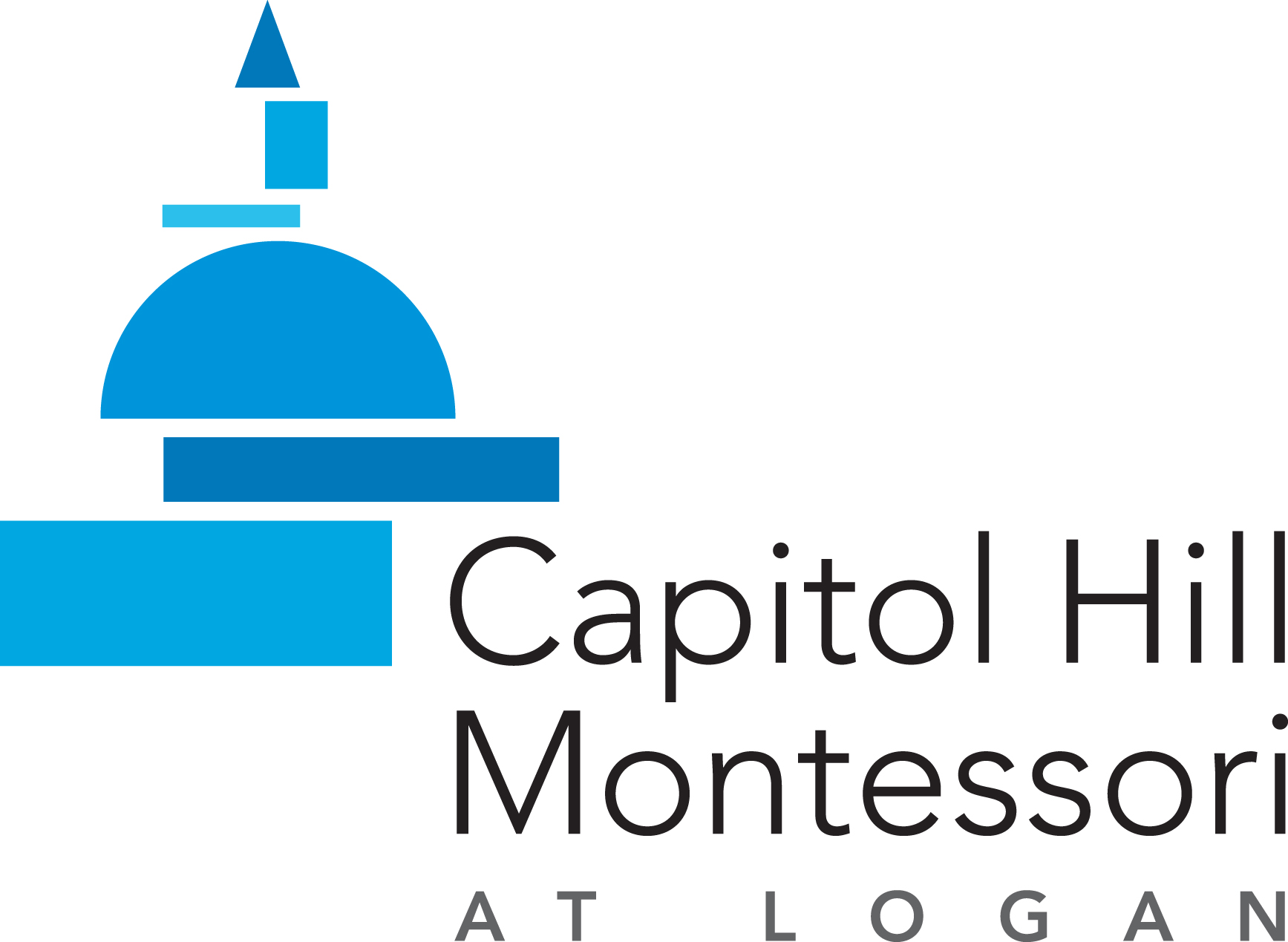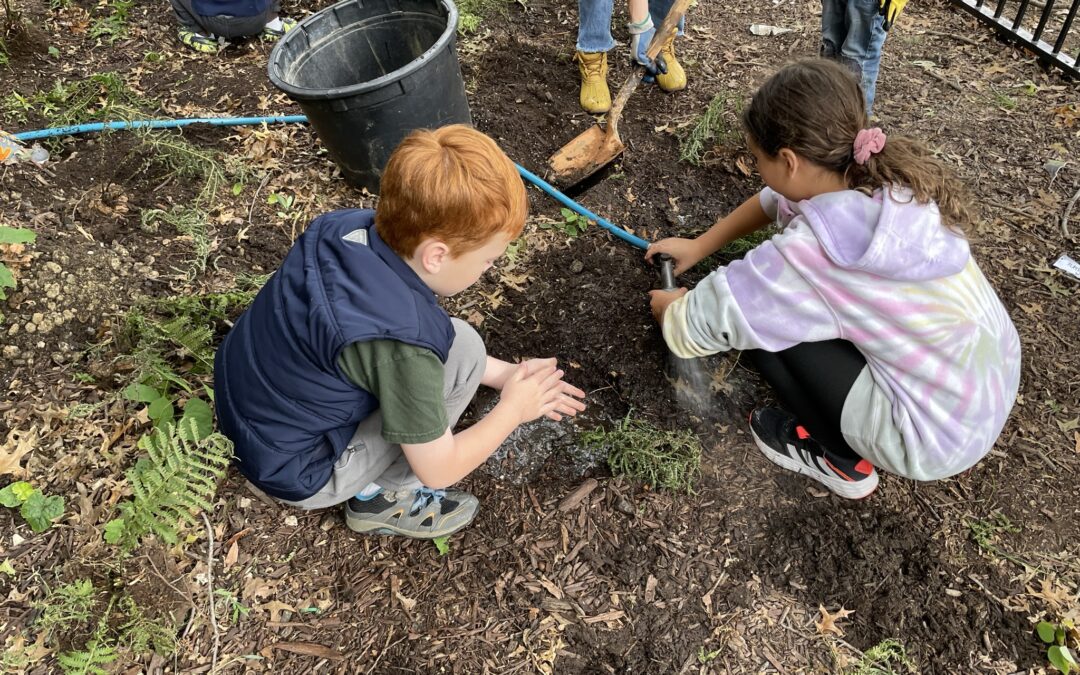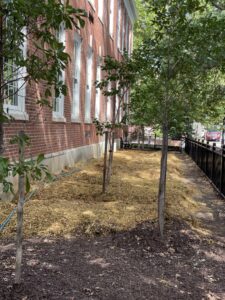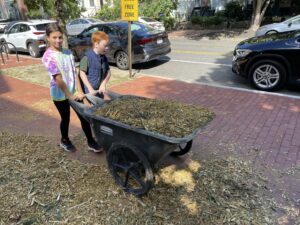Hello All, have you heard, we are getting an Urban Food Forest?
The Historic Logan School was modernized over the last several years as part of the DCPS Modernization Program. Prior to the modernization, Logan had a strong, productive Garden Program; the campus was filled with native species, pollinator-friendly plants, edible gardens, and outdoor classrooms. Although the modernization yielded exceptional upgrades to the Historic School and campus, construction activities decimated existing grounds and gardens. The Historic Logan School is ready for a fresh start.
CHML has teamed with several organizations in support of the overall Urban Food Forest, Campus Beautification, and Wellness Gardens Community Initiative–including the District Department of Transportation (DDOT) Urban Forestry Division (UFD) Urban Food Forest (UFF) program; the Garden Connect Grant; the University of the District of Columbia (UDC) College of Agriculture, Urban Sustainability, and Environmental Sciences (CAUSES) 4H program and Grow DC’s Master Gardeners–in addition to our enthusiastic CHML Garden, Health and Wellness (GHW) Committee with dozens of active volunteers (e.g., parents, students, faculty, staff, and community members).
- CHML is part of the District Department of Transportation (DDOT) Urban Forestry Division (UFD) (https://ddot-urban-forestry-
dcgis.hub.arcgis.com/) Urban Food Forest (UFF) program. DDOT UFD, working with FORESTED (www.FORESTED.us) will help design and build a full lifecycle education experience for the school and community. This UFF program will provide a campus master plan and drawings; large plants including trees, bushes, shrubs, flowers and related long-term food producing forest vegetation; “forest floor cultivation” edibles including fiddlehead ferns, mushrooms, leeks, and garlic; infrastructure elements including mulch, soil, and compost; as well as education support, guidance, and labor for installation and maintenance. For additional reading, please refer to the following Washington Post article on the program: https://www.washingtonpost. com/local/education/for-dc- students-lessons-in-
growth-of-the-garden-variety/2019/11/15/e72e4076-f2aa-11e9- 89eb-ec56cd414732_story.html - Our funded and awarded “green our planet” Garden Connect Grant (https://greenourplanet.org/
school-gardens) for Garden Curriculum and STEAM activities provides curriculum and guidance to teachers for classroom garden, health, and wellness integration. The Garden Connect grant will also help establish a community farmers market program. - University of the District of Columbia (UDC) College of Agriculture, Urban Sustainability, and Environmental Sciences (CAUSES) 4H program and Grow DC’s Master Gardeners (https://www.udc.edu/causes/
land-grant/center-for-urban- agriculture-gardening- education/master-gardener- program) have supplied CHML with seedlings. The DC Master Gardener volunteer training program trains volunteers in sustainable urban gardening practices. CHML PTSO will identify resident volunteers to graduate from the program; become certified Master Gardeners and go on to provide support for the garden-based projects and activities at CHML. Please let me know if you’re interested. - Our local Advisory Neighborhood Commission ANC 6C https://anc6c.orgprovided the PTSO GHW Committee with a generous $4,000 grant for garden tools and supplies. Please get to know your ANC representative; thank them for the work they do, every day, for all of us.
- Frager’s ACE Hardware, the place with the helpful hardware folks, has agreed to team with the PTSO providing greater discounts on items, guidance on materials and supporting co-sponsored fund-raising campaigns. Look for future announcements for round-up weekends and limited additional co-branded Frager’s swag.
- Our CHML PTSO Garden, Health and Wellness (GHW) Committee is a large, active committee of volunteers (e.g., parents, students, faculty, staff, and community members); meetings are held monthly, open to the public, and the community is encouraged to participate. We average 30 volunteers at our garden workday events, generally consisting of a 50/50 split between children and adults. The committee is committed to greater community engagement and will post future activities on local list-serves. In 2022, GHW volunteers planted 10 large wine cap mushroom beds and an edible fiddlehead fern garden along 3rd Street NE, taking advantage of the under-utilized shaded space. In mid-November 2022, volunteers will plant 1,000 flowering bulbs to help beautify the campus and to provide flowers in support of the Montessori flower-arranging lessons. On the same day, GHW volunteers plan to plant several hundred garlic bulbs.
The ultimate goal of the Urban Food Forest, Campus Beautification, and Wellness Gardens Community Initiative is to teach students how to produce edible products that they plant, harvest, eat, and sell at a weekly farm stand that they run, after school during pick-up time, and potentially at local farmers markets. The money raised will help the students support extracurricular activities, and teach them the farm-to-table lifecycle as well as the skills needed to start and run a business. The community will have access to the cultivated bounty from the forest floor and canopy including mushrooms, berries, leeks, garlic, ferns, herbs, fruits, vegetables, legumes, and more. The initiative will have a positive environmental impact on the community by adding biodiversity in plant species; attracting and increasing the population of pollinators (e.g., bees, butterflies, hummingbirds); and conserving resources and restoring healthy ecosystems by capturing carbon, producing oxygen, enriching soil, and diversifying habitats.
The successful outcome of this project is a more beautiful CHML campus for the whole community to enjoy, full of native species plants, pollinators, nitrogen fixers, shade trees, edible plants, agricultural products, outdoor classrooms, and garden beds. The beautification alone will improve the view for all walkers/drivers/cyclers providing a broader community benefit. We also plan to have several pop-up farmers markets from the harvest for the community to benefit from and enjoy.
Every student at CHML will have an impact in the garden: every student will be required to start a plant from seed and grow it to maturity. Most students will be more heavily engaged. We plan to produce the following biodiverse agricultural products and plants (native and cultivated). Many will take time to plant, grow, and be ready for harvest.
- Wine–Cap Mushrooms, Shitake Mushrooms
- Garlic Thyme, Sage, Rosemary, Basil, Lavender, Mint, Stevia
- Fiddlehead Ferns, Sunchokes, Yaupon Holly
- Serviceberry, American Elderberry, Bayberry
- Maypops / Passion Flower / Passion Fruit
- Pomegranates, Persimmons, Figs, Kiwi
- Acorns (Oak)
- Paw-Paw, Apricots, Asian Pears, Beach Plumbs
- Tomatoes, Peppers, Lettuces, Squashes
- Strawberries, Blueberries, Blackberries, Mulberry, Bush Cherry
- Wild Bergamot, Spicebush, Jujube
- Edible flowers, plus additional flowers for arranging
- Native pollinator flowers – Cone, Black-eyed Susan, Queens Ann, Evening Primrose, Milkweeds
- And more… please watch video from FORESTED: https://youtu.be/z_C_R1Z9ixE
A Master Plan design (like this one: https://www.forested.us/design



